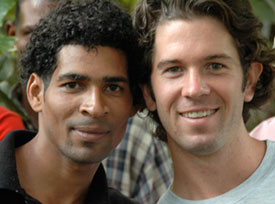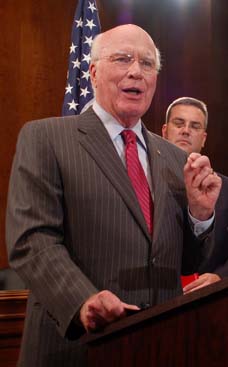
Although that part of the project was a success, it was just one step toward bringing running water to El Porvenir, Gradoville said. "The original design included an electric motor that, through a written agreement with the Leon local government, would be powered by a short extension of the electrical grid," Gradoville recalled. "But as time lagged on, it was clear that no work was going to happen any time in the near future." Toole and Kim continued to work with Project Gettysburg-Leon until they finally settled on powering the pump with a generator. The project was completed this past May. "I feel really lucky to have people who would go down there, follow up and figure out what we needed to do to power the pump," said Gradoville, who recently began a doctorate program in mechanical engineering with a focus on sustainability at the University of Pittsburgh. His program is funded through a National Science Foundation IGERT Fellowship. Gradoville spent the past two years as a "water volunteer" for the Peace Corps in the Dominican Republic. Drawing on lessons learned from the El Porvenir project, he coordinated the design and construction of two aqueducts to bring running water to families for the first time in Agua Larga, an isolated mountain community similar to El Porvenir. The aqueducts were partially gravity-fed and partially powered by a solar water pump as considered for El Porvenir. Gradoville also coordinated the construction of a solar-powered community center and the installation of solar power in every house in the community. The projects involved identifying community needs, writing and securing grants, coordinating materials delivery on a sometimes non-navigable dirt road and managing daily work brigades of local men. "I am extremely grateful," Gradoville said, "that the Bucknell Brigade gave me a small look into development work and an alternative to the traditional engineering career."
Dominican Republic RPCV Rob Gradoville helps build a pump house and install a pump in Nicaragua
Rob Gradoville, Class of '07
By Julia Ferrante
Rob Gradoville, Class of '07On a trip to Nepal in 2006, Rob Gradoville, Class of '07, couldn't help but notice that simple engineering projects made a big difference in poorer and more isolated parts of the world.
He kept that in mind while selecting a senior design project the following year at Bucknell University as he was completing his mechanical engineering degree program, and signed on to design and build a pipeline to provide running water to a mountaintop village in Nicaragua.
"It wasn't that complicated," Gradoville, of North Haven, Conn., recalled during a telephone interview from the Dominican Republic, where he has served in the Peace Corps for the past two years. "There were not a lot of complicated formulas, but we were thinking about things we hadn't really learned in class. We were dealing with real people, so we needed to make sure the project really worked and was suitable for the local conditions."
Gradoville worked with fellow 2007 classmates Adam Donato, Laura Roberts, Julie Jakobowski and Meghan Feller to design and extend a pipeline about 1,000 feet from a well at the base of a mountain to the tiny village of El Porvenir, near Leon. In January 2007, Gradoville, Jakobowski and Feller traveled with the Bucknell Brigade to Nicaragua to survey the situation first-hand. With the help of a local guide and a GPS system, the students staked out a path through the jungle from the well to the village.
Completed in May, the waterline was one of several Nicaragua-based outreach projects inspired by the Bucknell Brigade. It got its start in spring 2006, when Sarah Woodard of Jubilee House Community, the Brigade's host agency in Nicaragua, visited Bucknell. Woodard met with Donato and Charles Kim, an assistant professor of mechanical engineering, to discuss potential sustainable engineering projects in Nicaragua. That fall, the student engineers worked with Kim and Civil and Environmental Engineering Associate Professor Mike Toole to make the waterline a reality.
Shortly after they returned to Bucknell, the students secured a $10,000 grant from the Davis Foundation 100 Projects for Peace program along with donations from the Bucknell community and Project Gettysburg-Leon. Some were reluctant to pursue a Projects for Peace grant at first because of the competitiveness of the program and because the students did not have experience in grant writing. Gradoville pushed forward, however, noting that the Bucknell engineers had been working on a plan and design for a year already. The proposal initially was rejected for lack of clarity.
"I thought, 'We're trying to get water to people. We're engineers and know how to do this,'" Gradoville recalled. "We rewrote it, resubmitted it, and it got approved."
The 48 families that live in El Porvenir are part of a coffee cooperative that produces organic, shade-grown coffee for export to the United States. Until May, residents did not have running water for cleaning, cooking, drinking or bathing. There is no electricity in the village, and the only artificial light comes from flashlights and two solar-powered fluorescent lights in a school.
The water line has greatly improved the quality of life and health of those in El Porvenir, many of whom have contracted parasites and developed urinary tract infections because of the scarcity of drinking water during the six-month-long dry season.
The project also gave the engineering students experience solving problems in a global context.
After graduation, Gradoville and other students returned to Nicaragua for three weeks to build a pump house and install a pump. Although that part of the project was a success, it was just one step toward bringing running water to El Porvenir, Gradoville said.
"The original design included an electric motor that, through a written agreement with the Leon local government, would be powered by a short extension of the electrical grid," Gradoville recalled. "But as time lagged on, it was clear that no work was going to happen any time in the near future."
Toole and Kim continued to work with Project Gettysburg-Leon until they finally settled on powering the pump with a generator. The project was completed this past May.
"I feel really lucky to have people who would go down there, follow up and figure out what we needed to do to power the pump," said Gradoville, who recently began a doctorate program in mechanical engineering with a focus on sustainability at the University of Pittsburgh. His program is funded through a National Science Foundation IGERT Fellowship.
Gradoville spent the past two years as a "water volunteer" for the Peace Corps in the Dominican Republic. Drawing on lessons learned from the El Porvenir project, he coordinated the design and construction of two aqueducts to bring running water to families for the first time in Agua Larga, an isolated mountain community similar to El Porvenir.
The aqueducts were partially gravity-fed and partially powered by a solar water pump as considered for El Porvenir. Gradoville also coordinated the construction of a solar-powered community center and the installation of solar power in every house in the community. The projects involved identifying community needs, writing and securing grants, coordinating materials delivery on a sometimes non-navigable dirt road and managing daily work brigades of local men.
"I am extremely grateful," Gradoville said, "that the Bucknell Brigade gave me a small look into development work and an alternative to the traditional engineering career."













